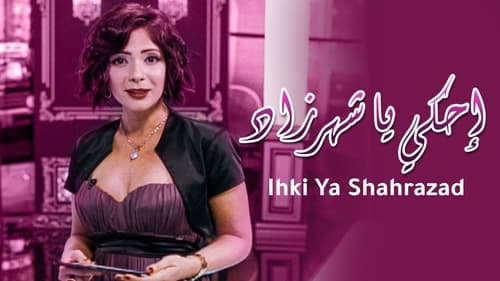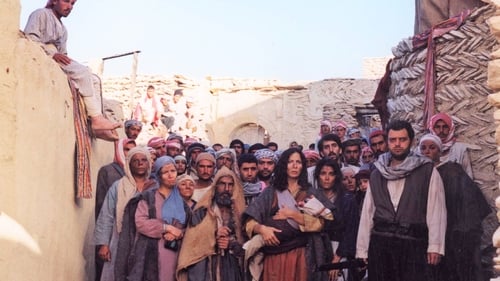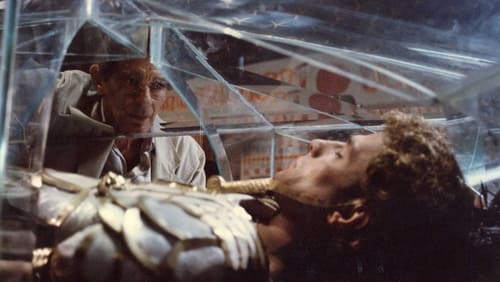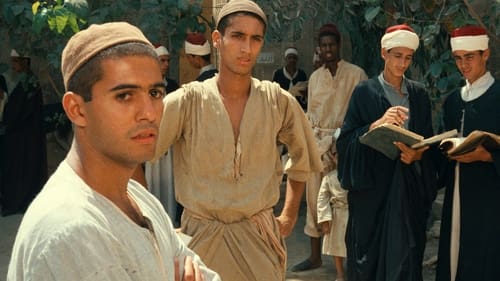
Yousry Nasrallah
Nacimiento : 1952-07-26,
Historia
Yousry was born in Cairo in 1952 to a Coptic family. He studied economics at Cairo University before studying cinema at the Higher Institute for Cinema in Cairo in 1973. Initially, Yousry worked as a cinema critic for a Lebanese paper named al-Safeer and as a director’s assistant in Beirut. He also worked as a director’s assistant with Youssif Chahine on the film projects “Wada’an Bonaparte” and “Hadoutta Masriyah” (1981). Furthermore, Yousry also worked with Folker Shlondorf on “al-Muzayyaf” and with ‘Umar Amiraly on the documentary title “Massaib Qoum”. Next, he participated in writing the screenplay for “Iskandiriyah Kaman wa Kaman” (1989) with Youssif Chahine and worked with him again in directing “al-Qahira Menawara bi Ahlaha” Yousry directed his first feature-length film in 1990, the work titled “Sariqat Sayfiah”, his second feature-length direction work was “Mercedes” (1993). Thereafter he directed “Sibbyan wa Banat” (Boys and Girls) in 1995 and “al-Madeena” (The City) in 1999. One of his best-recognized works “Bab al-Shams” (Gateway of the Sun) came about in 2004 and his last work was in 2008’s “Geneinat al-Asmak” .
Yousry has offered audiences a unique view through his works and has tried to use his films to portray clearly the mindset of Egyptian society and its psychological constituents. His first feature-length work “Sariqat Sayfiah” (Summer Thefts) was perhaps influenced by his own life story as it relates to the life of his wealthy Coptic feudal family and the farmers.

Co-Writer
After more than 20 years, Sue returns from Switzerland to her home country Egypt because her mother Fairouz is in a hospital bed. Sue ran away from the eccentric aristocrat as a young adult. Now she feels compelled to meet her again.

Director
Welcome Home

Writer
Yehia runs a catering business with his sons, Ref’at and Galal; the former is engaged to marry Karima, who actually loves his brother and is trying to find a way to reveal her feelings for him; while he himself is in love with Shadia who just returned from the UAE, but fear the differences between them.

Director
Yehia runs a catering business with his sons, Ref’at and Galal; the former is engaged to marry Karima, who actually loves his brother and is trying to find a way to reveal her feelings for him; while he himself is in love with Shadia who just returned from the UAE, but fear the differences between them.

Screenplay
Reem is a young political activist who works for an advertisement company. As she tries to uncover the truth behind the incide of the Battle of the Camel, she accompanies her friend Farah to Nazlet Al Seman where she meets and falls for Mahmoud, one of the people involved in the incident.

Director
Reem is a young political activist who works for an advertisement company. As she tries to uncover the truth behind the incide of the Battle of the Camel, she accompanies her friend Farah to Nazlet Al Seman where she meets and falls for Mahmoud, one of the people involved in the incident.

Writer
10 Film makers made 10 Separate stories about the "25January " revolution in Egypt and the Egyptian people in the revolution and the protests against the previous President Hosni Mubarak and the departure of President Hosni Mubarak and also displays what happened in Tahrir Square since the start of the sit-in

Director
10 Film makers made 10 Separate stories about the "25January " revolution in Egypt and the Egyptian people in the revolution and the protests against the previous President Hosni Mubarak and the departure of President Hosni Mubarak and also displays what happened in Tahrir Square since the start of the sit-in

Upon his return to Alexandria, Khaled becomes intrigued with a graffiti mural opposite his apartment. As he pursues this further, a larger underground arts scene slowly reveals itself, composed of musicians, filmmakers, and graffiti artists. As they struggle to get their voices heard, Khaled is compelled to help them acquire some much deserved visibility.

Director
Heba is a TV presenter interested in broadcasting stories that touch on the everyday secret lives of women and the social injustices they face. Her frank style in broadcasting puts her husband's job and consequently her marriage in jeopardy.

Writer
Youssef is a hotshot anesthesiologist who often sleeps in his car for privacy. Laila is the careerist host of a late night radio call-in show. These two members of Cairo's elite, lost souls traveling parallel paths of longing and disconnection, are the principal fish in Yousry Nasrallah's The Aquarium, a meditation on the intellectual capital of the Middle East, now bent under the sway of repression in all its forms.

Director
Youssef is a hotshot anesthesiologist who often sleeps in his car for privacy. Laila is the careerist host of a late night radio call-in show. These two members of Cairo's elite, lost souls traveling parallel paths of longing and disconnection, are the principal fish in Yousry Nasrallah's The Aquarium, a meditation on the intellectual capital of the Middle East, now bent under the sway of repression in all its forms.

Writer
Yousry Nasrallah's powerful adaptation of Lebanese writer Elias Khoury's epic novel of fifty years of Palestinian dispossession, exile, and resistance. The film follows the flight of Younes, his wife Nahila, and those around them, from their village in northern Palestine to a refugee camp in Lebanon. Some vow to continue the struggle, most simply struggle to survive. Unsparingly detailing the impact of the nakba (disaster) on Palestinian life and society and the refugees' often-contentious relationship with their reluctant Lebanese hosts, Gate of the Sun spans generations, mixing personal stories with historical events.

Director
Yousry Nasrallah's powerful adaptation of Lebanese writer Elias Khoury's epic novel of fifty years of Palestinian dispossession, exile, and resistance. The film follows the flight of Younes, his wife Nahila, and those around them, from their village in northern Palestine to a refugee camp in Lebanon. Some vow to continue the struggle, most simply struggle to survive. Unsparingly detailing the impact of the nakba (disaster) on Palestinian life and society and the refugees' often-contentious relationship with their reluctant Lebanese hosts, Gate of the Sun spans generations, mixing personal stories with historical events.

Writer
Ali, an aspiring actor, works in a government-aided butchery, and takes a part in a cheap play, while his father wants him to start working in fruit trade. Ali pursues his long-lived dream of traveling abroad and flies to France with an acting troupe, where he starts living illegally alongside many other Arabs, and starts a life-changing experience that he won't remember fully until he returns to Egypt.

Director
Ali, an aspiring actor, works in a government-aided butchery, and takes a part in a cheap play, while his father wants him to start working in fruit trade. Ali pursues his long-lived dream of traveling abroad and flies to France with an acting troupe, where he starts living illegally alongside many other Arabs, and starts a life-changing experience that he won't remember fully until he returns to Egypt.

Director
A documentary which depicts the life of Bassem Samra and his friends and family. The film discusses issues concerning love and the veil.

Writer
Nubi spent a period of his life in a mental hospital after his father deposited him unjustly. He is not crazy, but his father donated all he had to the Communist Party, which was adhering to its principles. The government then placed the family property under guard. Nubian lives with his mother Rose and discover amazing facts, including that his father, who bears his name is not his real father, but his mother gave birth to her brown friend, and then discovered that his brother missed the family and no one knows his place but joined the extremist group.

Director
Nubi spent a period of his life in a mental hospital after his father deposited him unjustly. He is not crazy, but his father donated all he had to the Communist Party, which was adhering to its principles. The government then placed the family property under guard. Nubian lives with his mother Rose and discover amazing facts, including that his father, who bears his name is not his real father, but his mother gave birth to her brown friend, and then discovered that his brother missed the family and no one knows his place but joined the extremist group.

Assistant Director
Set in 1987 against the backdrop of a hunger strike by the Egyptian film industry, Chahine himself steps in to play Yehia, the famed Egyptian director whose life is chronicled in "Alexandria, Why?" and "An Egyptian Story". Obsessed with Amr, the handsome actor he discovered and cast as his alter-ego in parts one and two of The Alexandria Trilogy, Yehia pressures Amr to star in various film projects that change even as Yehia's perception of the young actor begins to change. He first casts Amr as Hamlet, which the actor deems too demanding for his talents, then as the lead in a musical biopic of demigod Alexander the Great, who founded the city of Alexandria in 332 B.C.

Writer
Set in 1987 against the backdrop of a hunger strike by the Egyptian film industry, Chahine himself steps in to play Yehia, the famed Egyptian director whose life is chronicled in "Alexandria, Why?" and "An Egyptian Story". Obsessed with Amr, the handsome actor he discovered and cast as his alter-ego in parts one and two of The Alexandria Trilogy, Yehia pressures Amr to star in various film projects that change even as Yehia's perception of the young actor begins to change. He first casts Amr as Hamlet, which the actor deems too demanding for his talents, then as the lead in a musical biopic of demigod Alexander the Great, who founded the city of Alexandria in 332 B.C.

Writer
Set in the summer of 1961 during Nasser's land reforms, ‘’Summer Thefts’’ is the story of a childhood friendship between Yasser, the son of a bourgeois landowner, and Leil, the son of an Egyptian peasant.

Director
Set in the summer of 1961 during Nasser's land reforms, ‘’Summer Thefts’’ is the story of a childhood friendship between Yasser, the son of a bourgeois landowner, and Leil, the son of an Egyptian peasant.

Assistant Director
En el año 1798 el ejército francés liderado por Napoleón invadió Egipto, derrotando a todos los caciques mamelucos (que eran lo que quedaban del dominio otomano) y luego marchó sobre El Cairo. Tres hermanos viven cada uno a su manera este acontecimiento. Bakr, el mayor, planea la revuelta armada. Ali, el más intelectual de los hermanos, es partidario de un rechazo pacífico, mientras que Yehia, el menor, es tan inmaduro como impresionable y no se cierra al esplendor europeo.

Writer
En el año 1798 el ejército francés liderado por Napoleón invadió Egipto, derrotando a todos los caciques mamelucos (que eran lo que quedaban del dominio otomano) y luego marchó sobre El Cairo. Tres hermanos viven cada uno a su manera este acontecimiento. Bakr, el mayor, planea la revuelta armada. Ali, el más intelectual de los hermanos, es partidario de un rechazo pacífico, mientras que Yehia, el menor, es tan inmaduro como impresionable y no se cierra al esplendor europeo.

After we last see him in "Alexandria, Why?" Egyptian filmmaker Yehia Mourad is in his thirties, and successful in his work, he has grown distant from his wife and children and suffers a symbolic blockage of the heart while shooting the final scenes of his latest film. After being flown to England for evaluation, it's determined that Yehia must undergo emergency surgery. Fact and fiction blend seamlessly—with healthy doses of cleverly absurdist fantasy—as the film explores the various personalities and forces that have made Yehia (and Youssef Chahine) the man he has become.

Director
In a small Egyptian town, Zeinab, a young girl, strongly believes in myths and superstitions. With the help of Noah, her Christian neighbor, she abducts her mother’s body. During the escape journey, both Zeinab and Noah are confronted with many of the myths and fears they so strongly believed were true.







